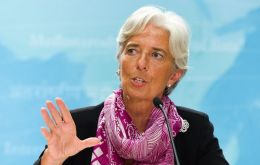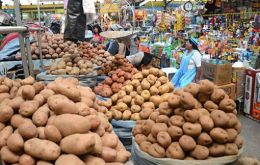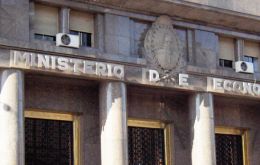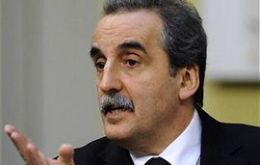MercoPress. South Atlantic News Agency
Tag: Indec index
-
Saturday, November 9th 2013 - 03:27 UTC
IMF holding constructive talks with Argentina on inflation and GDP data

International Monetary Fund announced it was holding “constructive” talks with Argentina about addressing flawed economic data that led to an unprecedented IMF censure of a member country.
-
Wednesday, October 23rd 2013 - 16:24 UTC
Argentine consumers expect Inflation in the next twelve months to average 31.3%

Expected inflation in Argentina for the next twelve months is on average 31.3% according to the monthly survey from the Torcuato Di Tella University, UTDT. However the monthly expectation dropped 1.6 percentage points compared to September in all regions of Argentina.
-
Wednesday, October 16th 2013 - 08:16 UTC
Official September inflation in Argentina 0.8%, less than half the so called Congress index

The Argentine government official Consumer Prices Index climbed 0.8% in September over August and reached 7.4% in the first nine months of the year, according to the National Stats Institute, Indec.
-
Friday, October 11th 2013 - 13:23 UTC
Argentina September ‘Congress index’ inflation 2.11% and 25.44% in twelve months

Argentina’s “Congress” Consumer Price Index which is an average of private consultants and is released by opposition lawmakers, showed that inflation in September increased 2.11%, the highest September since 1991, accumulating 25.44% in the last twelve months.
-
Wednesday, October 9th 2013 - 05:28 UTC
IMF forecasts higher growth for Argentina this year, but reliability of official stats remains controversial

Argentina’s growth has recovered because of an abundant crop but economic activity continues to be contained because of the exchange rate and other administrative controls, according to the IMF latest World Economic Outlook (WHE), Latam and Caribbean chapter released on Tuesday. The IMF statement refers to Argentina’s export duties and the so called ‘dollar clamp’ which bans even saving in US dollars.
-
Tuesday, September 24th 2013 - 08:04 UTC
Argentine trade balance collapsed 60% in August because of the energy import bill

Argentina’s trade balance collapsed 60% during August compared to a year ago because of stagnant exports and the doubling of energy imports according to the latest release from the government’s stats office, Indec.
-
Friday, September 13th 2013 - 01:34 UTC
Argentina forecasted to expand 5.1% this year and 6.2% in 2014, says budget presented to Congress

Argentina's economy is expected to grow 6.2% next year, while GDP in 2013 is forecasted to expand 5.1% boosted by a massive grains harvest and the automobile industry, Economy Minister Hernan Lorenzino said on Thursday while presenting the 2014 budget bill before Congress.
-
Thursday, September 12th 2013 - 01:20 UTC
Argentina inflation in August according to congressional index: 2.11%

Inflation in Argentina during August climbed 2.11% and 25.2% in the last twelve months according to the release from the Congress Freedom of expression commission. The so called Congressional index is an average of private consultants that have been intimidated from making public their estimates by the government of President Cristina Fernandez.
-
Monday, September 2nd 2013 - 19:49 UTC
Argentine officials admit inflation is higher than the official release from Indec

President Cristina Fernandez Victory Front’s parliamentary candidate for next October mid-term election, Martín Insaurralde admitted on Monday that inflation rate is higher than the one released by INDEC statistics agency although the agency is “transparent” and “must readjust to times and realities.”
-
Friday, August 16th 2013 - 03:18 UTC
Argentina’s official July inflation 0.9%, less than half private estimates

Argentina's Consumer Price Index (IPC) was up 0.9% in July, 5.7% in the first seven months of the year and 10.6% in the last twelve months, the official statistics bureau Indec reported on Thursday.
